Opinions & Interviews
Noskevich on the prospects of cooperation with the FBI, high-profile cyber crime cases
Chairman of Belarus’ Investigative Committee Ivan Noskevich is in the United States on a working visit. He is scheduled to meet with the FBI’s top-ranking officials and to visit a number of the bureau’s divisions and training academy. In an interview with BelTA in the run-up to the visit, Ivan Noskevich talks about the cooperation with the FBI, the biggest joint operations and shares his expectations of the upcoming meetings.
Mr Noskevich, what are the common interests of the Investigative Committee and the FBI? What things will the two agencies discuss at the upcoming meeting?
We know that crime has no nationality. We can also say it has no borders. It is precisely the reason why we should keep in touch with colleagues from around the world.
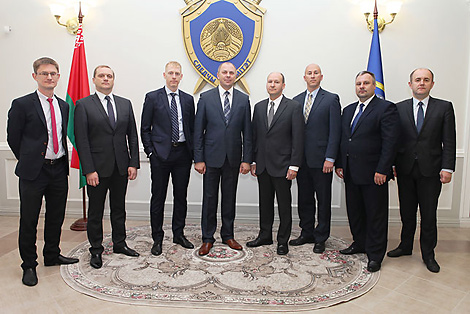 Literally every household has access to the internet today. Sometimes criminals do not even need to get up from the chair to steal money from credit cards of a person hundreds, thousands and even tens of thousands of kilometers away. Such crimes are usually committed by transnational organized groups who easily cross virtual borders between the states and take advantage of the loopholes in the legislation of various countries. Moreover, cyber attacks are becoming increasingly sophisticated.
Literally every household has access to the internet today. Sometimes criminals do not even need to get up from the chair to steal money from credit cards of a person hundreds, thousands and even tens of thousands of kilometers away. Such crimes are usually committed by transnational organized groups who easily cross virtual borders between the states and take advantage of the loopholes in the legislation of various countries. Moreover, cyber attacks are becoming increasingly sophisticated.
Respectively, law enforcement agencies must stay ahead of the technology curve. Both agencies pay serious attention to the quality of technologies and personnel. Because it is always a man who is behind the most advanced computers or innovations.
We are happy that today Belarusian investigators do not just communicate with U.S. colleagues on an equal footing but also participate in joint operations to apprehend cyber criminals and in the investigations of the criminal cases involving the damage worth millions of dollars. The fact that the FBI is often mentioned in press releases of Belarus’ Investigative Committee no longer comes as a surprise for the public. Everybody has gotten used to the fact that this is a routine cooperation and legal assistance. Criminals are starting to realize that there is no place in the world where they can hide from justice.
I would like to note that meeting the FBI leadership is not an end in itself for the Investigative Committee. We see it as a great opportunity to improve the work of our committee. We want to get acquainted with the capacities of the U.S. agency. It is no secret that the FBI makes an active use of the IT. We have something to learn from them and something to work with.
How did the cooperation with the FBI start?
Representatives of Belarus’ Investigative Committee first visited the FBI training center against cybercrime in the summer of 2015 to discuss some details of one of the joint operations. Back then Alexander Sushko, the head of cybercrime investigations, established the interaction with the FBI as part of the investigation of other cases. He also discussed the possibility of Belarusian specialists participating in training workshops.
Ten months later, at the invitation of the U.S. side, we sent another representative, who was involved in the investigation of a join criminal case, to the cybercrime center in Pittsburgh. The trip lasted nearly a month and a half. Our representative also attended the seminars and used the FBI databases for information under other criminal cases.
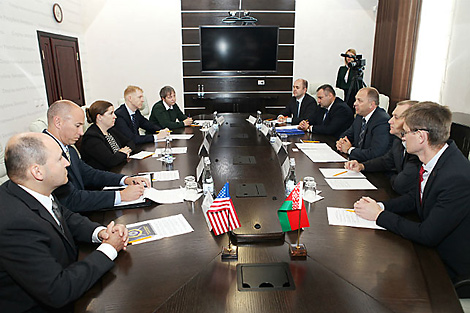 In fact, that was the starting point of our interaction. Since 2015 we have held eight working meetings and training seminars, and many joint operations. I would like to note that not only representatives of the Investigative Committee go to United States. FBI agents have become frequent guests of Belarus and our committee.
In fact, that was the starting point of our interaction. Since 2015 we have held eight working meetings and training seminars, and many joint operations. I would like to note that not only representatives of the Investigative Committee go to United States. FBI agents have become frequent guests of Belarus and our committee.
For example, in June 2017 the FBI representatives came to Minsk as part of the request for legal assistance in the criminal proceedings. The FBI agents were present during the interrogation of a suspect, received the copies of our materials and hard drives seized by our main investigations department during the investigation. They used this information to establish all the facts of illegal activities on the territory of the United States.
At that time I had a meeting with our colleagues and we discussed the provision of legal assistance in criminal matters, and the prospects of international cooperation in the fight against crime.
During numerous meetings, the Investigative Committee established working contacts with FBI representatives and obtained materials from their databases on the persons featuring in our criminal cases. Thanks to the help from the FBI, the Investigative Committee undertook some measures to chase down the offenders hiding in the USA and other countries. Their locations have been detected, and now the measures are being taken to deport these citizens out of the United States to charge them in Belarus.
Could you please cite some more examples of fruitful cooperation with the FBI?
There are plenty of examples. Now the Investigative Committee needs to obtain the information from the FBI to confirm the fraudulent nature of the operations by banks-issuers of payment cards which were used for theft purposes by a citizen of Belarus who stood accused in one of criminal cases. This case is now being investigated by the High Tech Crime and Intellectual Property Department of the Investigative Committee's Central Office. The information to be obtained during the visit to the United States will simplify the investigation to a great extent.
During joint operations FBI specialists often inform Belarusian investigators that they have some additional information on the criminal activities of the individuals featuring in the criminal cases we are investigating. The FBI then checks and processes this information to provide it to Belarus without any troubles.
These examples show once again that the punishment for a crime is inevitable in any part of the world. This is why such cooperation in law enforcement is of special value.
The recent apprehension of a Gomel Oblast resident, a member of an international cybercrime organization, is also the result of the long-standing cooperation between the Belarusian and U.S. law enforcement agencies, isn't it?
Indeed, our competent authorities identified a person who was involved in the distribution of the Andromeda malware in different countries. According to the initial information we were in possession at that moment, that act could be categorized as a misdemeanor under Belarus’ Crime Code (Part 1 of Article 354). In this regard, the offender could not be taken into custody after the apprehension. After the initiation of criminal proceedings, such criminals take measures to avoid prosecution and destroy the information that could prove their involvement in a crime.
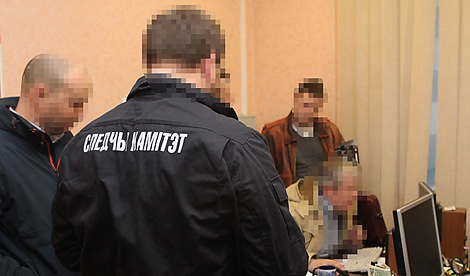 We had reasons to believe, however, that the information about the criminal activities of the Belarusian was incomplete. The investigators decided to apprehend the person only once they received the necessary data from the USA. The FBI promptly provided the required materials, which helped us detect new crimes.
We had reasons to believe, however, that the information about the criminal activities of the Belarusian was incomplete. The investigators decided to apprehend the person only once they received the necessary data from the USA. The FBI promptly provided the required materials, which helped us detect new crimes.
 As a result, in November 2017 the Investigative Committee and the FBI conducted a successful operation with the participation of the police against the international cybercrime organization Andromeda. The operations center was located in the Hague, Netherlands.
As a result, in November 2017 the Investigative Committee and the FBI conducted a successful operation with the participation of the police against the international cybercrime organization Andromeda. The operations center was located in the Hague, Netherlands.
Due to the effective teamwork, the law enforcement agencies dismantled a vast computer network of malware servers. The investigation is still underway.
Thousands, maybe even hundreds of thousands of people across the globe fall victims to cybercrime. The damages are estimated in millions of U.S. dollars…
As for Andromeda, from three to four million computers were infected by the malware every month. As of October 2016, over 570,000 PCs were at the stage of active malware infection. According to the latest data provided by the USA, an anti-cybercrime center of a world-renowned company estimates that the total damage caused by Andromeda surpasses $10 million. This is but one case. There are some numbers from another criminal case. Upon our request for legal assistance, the FBI sent us statements of American and Canadian companies confirming that there were repeated cases of theft to the tune of $100,000 and more which was previously established by Belarus.
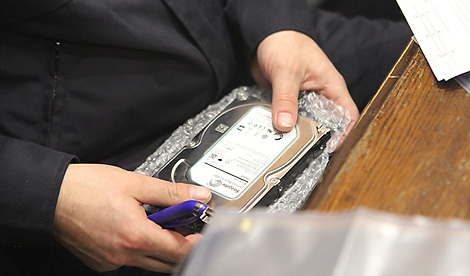 There is no agreement on mutual legal assistance between Belarus and the United States. Does it have an impact on bilateral cooperation?
There is no agreement on mutual legal assistance between Belarus and the United States. Does it have an impact on bilateral cooperation?
Unfortunately, we have no written agreements due to different reasons. We have to interact with our counterparts on the basis of other agreements. In some cases the cooperation between the two countries in the investigation of criminal offences, and especially in the identification, freezing and tracing proceeds of crime, and also in the confiscation and recovery of assets, is possible on the basis of the United Nations Convention against Transnational Organized Crime (2000) and the United Nation Convention against Corruption (2003), since Belarus and the United States are among the signatories to these documents.
Unfortunately, this is not enough for successful bilateral cooperation in criminal investigations. We are interested in signing a document on cooperation, and I sincerely hope that our meeting will be the first step towards this goal.
We are deeply convinced that the conclusion of a full-fledged agreement on mutual legal assistance in criminal matters meets the interests of the two countries.
It is important that the United States also shows interest in bilateral cooperation. Practice has showed that there are many cyber criminals in Belarus who commit unlawful acts, including against US citizens and US companies. A number of crimes recently solved and a number of persons recently arrested in Belarus, including with the help of the FBI, testifies to the fact.
The fact that there is no FBI attache in Belarus is another factor that complicates the interaction between the agencies of the two countries. Any inquiries need to be sent through the General Prosecutor’s Office to the Ministry of Foreign Affairs or the FBI attache in Kiev, which protracts the process of receiving operational information. The agreement on mutual legal assistance will simplify and accelerate such processes.
It also makes sense to continue internship of our investigators at the FBI Cybercrime Center in Pittsburgh.
What practices, in your opinion, Belarusian investigators can adopt from the FBI? What are your expectations of this working visit?
The results of the trip will be reviewed and analyzed once we are back in Minsk. At present, we can, however, say what we are expecting from the visit. There are many positive examples of the FBI's work. Among them is the optimization that is an inevitable thing for any big agency. The tasks and working modes change constantly. This means that law enforcement bodies should change their structure as well, in order to carry out their tasks in the most efficient way.
The FBI is a compact agency with a well-branched structure. We are primary interested in the FBI Criminal, Cyber, Response and Services Branch. Its tasks are similar to ours. In fact, it is a mini Investigative Committee within the FBI.
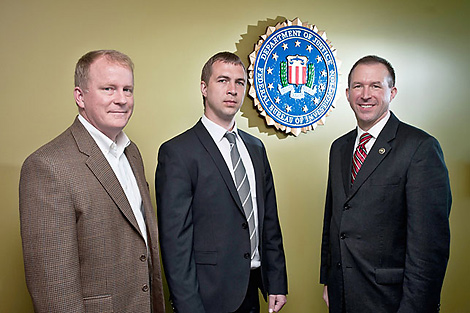 The FBI Information and Technology Branch and FBI Science and Technology Branch are at the same level with the FBI Criminal, Cyber, Response and Services Branch. Yet, the staff is quite small. There is no excessive paperwork; electronic document management is a commonplace practice.
The FBI Information and Technology Branch and FBI Science and Technology Branch are at the same level with the FBI Criminal, Cyber, Response and Services Branch. Yet, the staff is quite small. There is no excessive paperwork; electronic document management is a commonplace practice.
I would like to note that we are also making confident steps in this direction. We are currently working on the Unified Automated Information System. The system will help the Investigative Committee enhance the efficiency of investigations through the automation of many routine processes, like processing criminal case materials, expediting the receipt of information necessary for investigation from databanks, and reducing the burden placed on state bodies to produce responses to investigators' inquiries.
We have just started the development of the system. We have studied the experience of our counterparts from Armenia, Kazakhstan and Georgia. It will be very interesting for us to see how the FBI information system functions. It would be useful for us to see what things are not worth wasting time and resources, and what things we should focus on when developing the system.
Svetlana SAVKO
BelTA







 print version
print version make home page
make home page add to bookmarks
add to bookmarks

